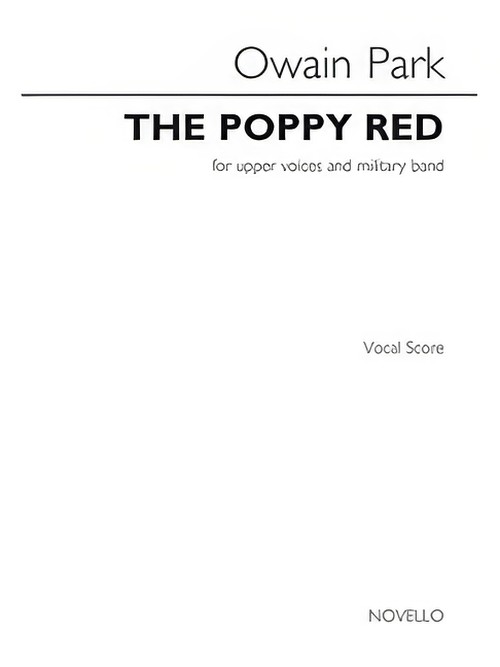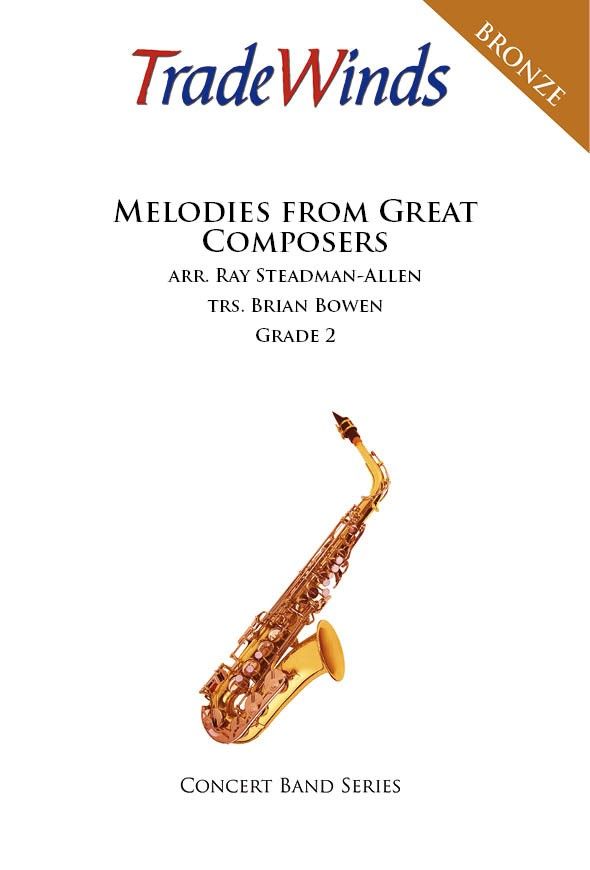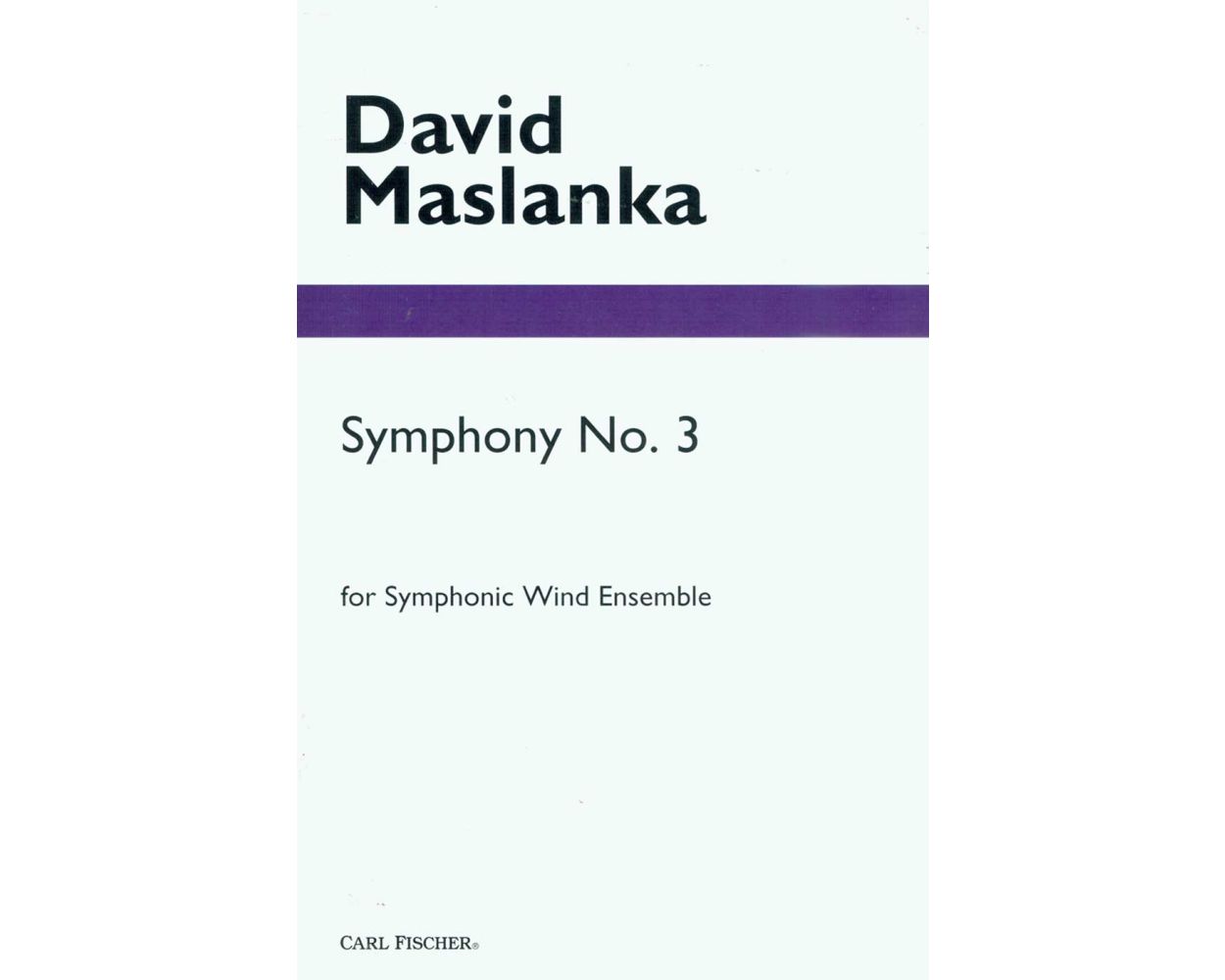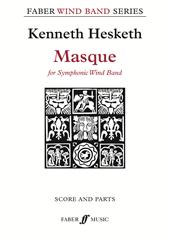Results
-
 £7.50
£7.50TUNES FROM THE TRENCHES (SSA vocal score) - Lawson, Peter
For SSA choir and orchestra or concert band, or choir and piano.A non-stop medley of tunes from World War One from recruiting through to the Last Post. This arrangement can be performed by a choir with either an orchestra, band or piano accompaniment. There are different choral versions available for Mixed Voice Choir - both SATB (GM131) and, for those with a shortage of male voices, SA+Men (GM134) - for Upper Voice Choir (SSA - GM132) and for Male Voice Choir (TTBB - GM133). The orchestra score and parts (GMCP020) can be used either on its own or to accompany a choir.The recruiting song "Your King and Country Want You" starts us off followed by "Goodbye, Dolly Gray" as the soldiers leave for war. "Belgium put the Kibosh on the Kaiser" is followed by some proper trench songs - various lyrics were improvised by the soldiers!! - "Three German Officers crossed the Rhine" and "They were only playing Leap-Frog". "The Bells of Hell go Ting-a-ling-a-ling" leads to strains of "Stille Nacht" recalling the Christmas truce. "When this Lousy War is Over" and "There's no place like Home" are balanced by "Land of Hope and Glory" before the Americans arrive with "The Caissons go Rolling Along" and "Over There". "It's a Long Way to Tipperary" brings us towards a rousing finish save for an optional "Last Post-lude" to end reflectively.
Estimated dispatch 7-14 working days
-
 £174.99
£174.99Two Symphonic Interludes Wind Band Set (Score & Parts)
Based on the poems by German poet Carl Hauptmann (late Romanticism) and the English poet William Wordsworth (early Romanticism). Carl Hauptmann was in poor health as a child, but highly intelligent. He studied philosophy, psychology and biology. In the latter he was admitted to the degree of doctor. His marriage provided financial independence, so that he could focus on his studies. Hauptmann wrote various novels, plays, poetry and scientific works. Night Twilight floats above the valley's night mists are hanging, there's a whispering brook. Now the covering veil is lifting quite: come and look! See the magic land before our gaze: tall as dreams the silver mountains stand, crossed by silent silver paths shining from a secret land. Noble, pure, the dreaming country sleeps. By the path the shadow black and hogh of a beach. a wisp of a white smoke creeps to the dark'ning sky. Where the valley is the darkest hued countless little lights shine silently. O my soul! Drink of solitude! Carl Hauptmann Wordsworth 'introduced' a new type of poetry, based on the speech of the common man. This was his answer to the poetry of the classicism which was bound by rigid rules. His definition of poetry was: the spontaneous overflow of powerful feelings from emotions recollected in tranquility. My heart leaps up when I behold a rainbow in the sky My heart leaps up when I behold A rainbow in the sky: So was it when my life began. So is it now I am a man. So be it when I shall grow old, Or let me die! The Child is father of the Man. And I could wish my days to be Bound each to each by natural piety. William Wordsworth In a truly poetic manner Harrie Janssen has transformed the contemplative thoughts of the poets into two compositions for Concert Band. 10:45
Estimated dispatch 7-14 working days
-
 £2.25
£2.25The Poppy Red (Upper Voices Vocal Score) - Park, Owain
Commissioned by the Military Wives Choirs to commemorate the centenary of 1918, the end of the First World War. The Military Band Accompaniment is available separately - NOV167387To mark the centenary of the end of World War I, the Military Wives Choirs - 69 choirs from across Britain and abroad - commissioned Owain to write a piece for their album, 'Remember'. The text for Owain's work, 'The Poppy Red', is inspired by the 1918 poem 'We Shall Keep The Faith' by Moina Michael, itself inspired by John McCrae's 'In Flanders Fields'. The recording brought together 1105 voices with The Band of the Household Cavalry, conducted by Hilary Davan Wetton.
Estimated dispatch 7-14 working days
-
£34.95
Melodies from Great Composers
Ray Steadman-Allen has selected 4 melodies, composed by some of the great composers, and linked them together to form a medley that will appeal to many a listener. 'Soldier's March' by Schumann, Haydn's 'Aria', 'Waltz No. 3' by Schubert and the exciting theme from 'William Tell' by Rossini have all been featured to make both a interesting and educational medley for young bands.
Estimated dispatch 7-14 working days
-
£70.00
Masque - Kenneth Hesketh
A Masque (short for Masquerade) has been defined by Historians as 'A revel in which Mummers or masked folk come with torches blazing into the festive hall and call upon the company to dance and dice' . The chaos of this dramatic dance is depicted in this 'Masque' by Hesketh. The main theme is bravura and is often present, in the background. The form of the piece is a simple scherzo-trio-scherzo. Colourful scoring (upper wind solos, trumpet and horn solos alternating with full bodied tuttis) with a dash of wildness may tease both player and listener to let their hair down a little!Masque has been transcribed for wind band by Kenneth Hesketh from his 'Scherzo for Orchestra', commissioned by the National Children's Orchestra in 1987.
In stock: Estimated delivery 1-3 days
-
 £74.09
£74.09Temperamental (Concert Band) Fendall Hill
This work by Fendall Hill was the set test for the 2021 National Brass Band Championships of New Zealand, B Grade. Here it has been adapted for Concert Band. The composer writes: 'J.S. Bach (1685-1750) is deemed by many to be the 'Ulimate Composer'. He added an incredible proportion to the DNA of western music, and his influence is heard in the music of today. Like many artists, he was not overly recognised as a composer during his lifetime, and it took an 1829 performance of the St Matthew Passion by Mendelssohn to ignite a recognition of his place in the music world, a place he has maintained ever since. This piece starts with a similar spark of rediscovery of the music of Bach. It contains arrangements of various works, interspersed with composition based on Bach's chord structures, sections in the style of Bach, and original sections inspired by the moods created along the way. The first section explores the Toccata, and great organ works. This leads into an exploration of his choral works, and a finale based on the Preludes. The word 'Tempered' has different meanings, and all seem to apply to the music of Bach, and these appeal to the musical, engineering and spiritual aspects of my personal life. His music reaches to the humanity and divinity, it has strength, structure and order that creates frameworks in which incredible complexity reigns; and the complexity leads to a wildness, a kind of craziness that represents a range of human moods, and can change without warning. The same piece of music affects people in very different ways. I don't know if it's Bach's music, or us, but it can seem out of control and under control at the same time - the combination is highly temperamental. To view a follow-the-score video of the work please visit: https://youtu.be/6CtYZmCoWIc Sheet music available from: UK: www.wind-band-music.co.uk USA: www.solidbrassmusic.com Difficulty Level: Advanced Instrumentation: Instrumentation: Piccolo Flute 1-2 Oboe Bassoon Clarinet in Bb 1-3 Bass Clarinet in Bb Alto Saxophone 1-2 Tenor Saxophone Baritone Saxophone Trumpet in Bb 1-3 Horn in F 1-4 Trombone 1-2 Bass Trombone Euphonium Tuba Double Bass Timpani Percussion 1-3
In stock: Estimated dispatch 1-3 days
-
 £34.95
£34.95Melodies from Great Composers
Duration: 5:00Series: TradeWindsGrade/Difficulty: 60Arranger: Ray Steadman-AllenTranscriber: Brian BowenRay Steadman-Allen has selected 4 melodies, composed by some of the great composers, and linked them together to form a medley that will appeal to many a listener. Soldiers March by Schumann, Haydns Aria, Waltz No. 3 by Schubert and the exciting theme from William Tell by Rossini have all been featured to make both a interesting and educational medley for young bands.
Estimated dispatch 7-14 working days
-
 £8.00
£8.00The New Bennett Band Book - Harold Bennett
The Bennett Band Books, published in four volumes starting in 1923, were used to teach literally millions of young band musicians in the middle of the twentieth century the march form and style. The pieces utilized in this book are: Activity, Summit, Success, Project, Courage, Mister Joe, Genius, Improvement, At Sight, Little Rastus, Laurel and Aline. These delightful marches, composed by famous march composer Henry Fillmore using the pseudonym Harold Bennett, have been given new life by arranger Larry Clark. The original essence of these marches is retained and only the instrumentation and some range issues have been altered to fit the needs of today's developing bands. This collection includes twelve of the Bennett marches along with a helpful march warm-up section composed by Larry Clark to help you teach the march form and style to young students. There is the added benefit of a full recording of each march performed by a professional band on the CD that is included in the conductor's score. This is a valuable collection for any level band to use for marches at contest/festival performance or for sight-reading purposes.
Estimated dispatch 12-14 working days
-
 £90.00
£90.00Symphony No. 3
The largest of David Maslanka's wind symphonies in scale and duration, Symphony No. 3 was commissioned by the University of Connecticut Symphonic Wind Ensemble, Gary Green, conductor, and premiered by them in 1991. It is in five movements and lasts nearly 50 minutes. The moderate tempo and forceful character of the first movement contrast with the serene "nature" music of the second movement. The third movement, a fast and bristling scherzo largely in A Minor, is followed by two slower movements, both labeled "lament." The composer characterizes the music of these movements as both sorrowful and joyful. The fifth movement, in particular, has the lamenting character overcome by an ecstatic vision of natural beauty and the life force. Symphony No. 3 is arguably Maslanka's most profound and satisfying large-scale work, and it ends in an unequivocal A Major that has the feeling of a benediction. Large score and parts are available on rental.
Estimated dispatch 12-14 working days
-
 £87.99
£87.99Cityscape - Jan Hadermann
Cityscape was commissioned by Concertband Antwerp for the 't Stad Geblazen event, which took place during the weekend of European Heritage Days in 2024.This short concert piece describes the impressions given when approaching and visiting the beautiful Belgian city of Antwerp from the north across the river Scheldt. We first pass the busy bustle of the harbour, home to the impressive Port House. Then the old city comes into view: the graceful cathedral tower, surrounded by smaller church spires and modern buildings, dominates the distinctive skyline. After setting foot ashore, we are struck by the beautiful way the medieval buildings here blend harmoniously with modern architecture. Our walk through the city continues: we visit the serene cathedral and are impressed by the picturesque faades of and around the city hall, as well as the Brabo Fountain on the Grote Markt (Large Market Square). Finally, it is time to enjoy the merriment taking place on the many squares of the lively city centre.
Estimated dispatch 7-14 working days

